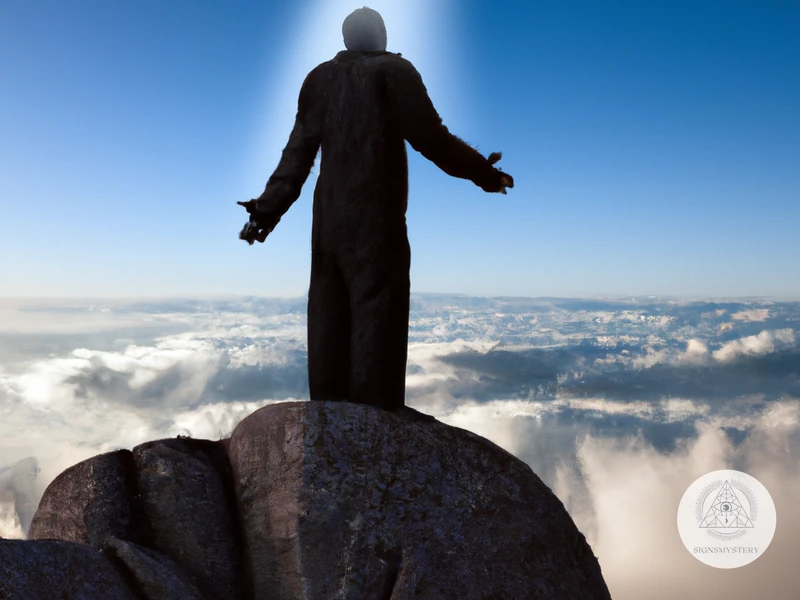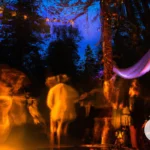Shamanism is an ancient spiritual practice that has been around for centuries and is still widely used today. One of the essential components of shamanism is the vision quest, where shamanic practitioners go out into nature to connect with their inner selves, the spirit realm, and the natural world. Vision quests are a transformative experience that can help individuals discover their inner truth, find their life purpose, and connect with their ancestors. In this article, we will explore the purpose and significance of vision quests in shamanism. We will also discuss how to prepare for a vision quest and what to expect from this sacred spiritual practice.
What is Shamanism?
Shamanism is a spiritual practice that involves a practitioner, known as a shaman, who interacts with the spiritual world through ecstatic experiences. The term shamanism comes from the Tungus people of Siberia and was first introduced to the West in the 18th century. A shaman is a person who can interact with the spirits of the natural world, including animals and plants, as well as the spirits of the ancestors.
In shamanic cultures, a shaman serves as a healer, counselor, and spiritual guide. Shamans use various techniques to enter a trance state and communicate with the spirit world. This practice is often accompanied by the use of plant medicines, such as ayahuasca and peyote, which are considered sacred and used in traditional ceremonies.
Shamanism is a universal practice found in many cultures around the world, including Native American, African, and indigenous Siberian cultures. While the practices may vary, the core beliefs and principles of shamanism remain the same.
Shamanism is based on the belief that everything in the natural world has a spirit and that these spirits can be communicated with through rituals and ceremonies. This includes not only animals and plants but also rocks, mountains, and bodies of water. Shamanism emphasizes the interconnectedness of all things and the importance of living in harmony with the natural world.
Shamans play an important role in their communities, serving as intermediaries between the physical and spiritual worlds. Their work involves healing physical and emotional illnesses, as well as offering guidance and counsel to those in need.
Shamanism provides a framework for understanding our place in the world and our relationship to the natural world. It is a practice that emphasizes the importance of living in harmony with nature and recognizing the interconnectedness of all things.
If you’re interested in learning about shamanism, check out our article on debunking vision quest myths, which explains some of the common misconceptions about this spiritual practice.
What is a Vision Quest?
Vision Quests are an essential part of Shamanism, and they hold a significant place in Native American tribes’ culture and spiritual practices. In shamanic terms, a vision quest is known as a “hunger to know”. It is a rite of passage, a form of spiritual journey or a quest for guidance and insight, which usually involves fasting, meditation and being alone in nature for several days or even weeks. During a vision quest, shamanic practitioners seek visions or dreams that can bring them closer to their divine beings and spirits that can guide them through life.
The quester looks for guidance, spiritual advancement, solutions to problems or the answering of important life questions. The vision quest represents a person’s desire to experience something beyond the ordinary, and the rewards are immense. A successful vision quest can provide clarity of mind, emotional and spiritual healing, personal transformation, and deepening connection with the natural world.
The duration of the vision quest varies depending on the tribe, the individual’s goals and spiritual maturity. While some tribes may conduct vision quests that last only a few days, others may last for weeks. It is a process that requires a great deal of discipline, spiritual preparation, and mental and emotional fortitude.
A vision quest is a spiritual practice that involves fasting, introspection, and being alone in nature for several days or even weeks. It is a journey into the psyche to seek guidance and insight from the spirits and the divine, which results in a deeper personal connection with one’s self and the world around them. If you want to know more about the preparations for a vision quest, you can read our article on how to prepare for a vision quest.
Why Do Shamanic Practitioners Go on Vision Quests?
Shamanic practitioners go on vision quests for a variety of reasons. A vision quest can be a powerful and transformative experience for those who are seeking spiritual guidance or seeking to connect with their higher selves. Here are some reasons why shamanic practitioners might choose to embark on a vision quest:
| Reason | Description |
| Seeking guidance | Shamanic practitioners may go on a vision quest to seek guidance from their spirit guides or higher self, to gain wisdom and insight into their lives and the world around them. |
| Connecting with nature | Many shamanic practitioners believe that spending time in nature can help to connect with the natural world and the spirits that reside there. A vision quest allows them to fully immerse themselves in nature and connect with the land and its inhabitants. |
| Healing | Some shamanic practitioners believe that a vision quest can help with physical, emotional, and spiritual healing. The quiet and reflective time spent on the quest allows them to focus on their innermost thoughts and feelings, which can lead to healing and a sense of clarity. |
| Seeking purpose | Shamanic practitioners may go on a vision quest to find their true purpose in life. Through the experience of solitude and reflection, they may gain clarity and insight into their true calling. |
These are just a few of the reasons why a shamanic practitioner might choose to go on a vision quest. The experience can be incredibly rewarding, providing guidance, clarity, healing, and purpose. Later in this article, we’ll explore the purpose and significance of vision quests in more detail. If you’re interested in learning more about the different types of vision quests, you can check out our article on Types of Vision Quests. Additionally, if you’re curious about the meanings of animal spirit guides in vision quests, you can read our article on Animal Spirit Guides Meanings in Vision Quests.
The Purpose of Vision Quests

Discover Inner Truth: The main purpose of a vision quest is to discover one’s inner truth. It’s a journey that involves introspection, self-reflection, and meditation, which eventually leads to a profound understanding of oneself. During a vision quest, one spends days in the wilderness, which gives one ample time to connect with their spirit, gain clarity about their purpose, and receive insights about life. By seeking one’s inner truth, one can overcome self-doubt, limiting beliefs, and find answers to long-standing questions.
Connect with Spiritual Beings: In shamanic culture, a vision quest is also a means of connecting with spiritual beings. By spending time in nature, one can tune into natural rhythms and cycles, which can help one connect with the spirits of the land, animals, and ancestors. Through this spiritual connection, one can seek guidance, wisdom, and a deeper understanding of the natural world.
Find One’s Purpose in Life: Another important purpose of a vision quest is to find one’s purpose in life. By engaging in deep introspection and reflecting on one’s life, one can gain insight into their strengths, weaknesses, and passions. This can lead one to discover their life’s purpose, which can bring meaning, fulfillment, and a sense of direction to one’s life.
Reconnect with Nature: With modernization, human beings have become detached from the natural world. A vision quest is a means to reconnect with nature, to appreciate its beauty and bounty and tune into its rhythms and cycles. Spending time in nature can be rejuvenating and can help one gain clarity, focus, and inner peace.
A vision quest is a life-changing experience that can help one find their inner truth, connect with spiritual beings, discover their purpose, and reconnect with nature. Understanding the purpose of a vision quest is essential to become prepared for it. In the next section, we will discuss the significance of vision quests. If you’re wondering about the typical vision quest steps, feel free to check out our article on typical Vision Quest Steps.
Discover Inner Truth
In shamanism, a vision quest is a sacred practice that aims to help individuals connect with their inner selves. One of the main purposes of a vision quest is to discover one’s inner truth, which can help individuals make important decisions in life.
During a vision quest, individuals spend a significant amount of time alone in nature, away from distractions and the hustle and bustle of everyday life. This allows them to focus their mind and attention on their inner experience.
By shutting out the external world and going deeper within themselves, individuals may have profound insights into their lives, beliefs, and values. They may realize what truly matters to them and what they need to do to live a purposeful and fulfilling life.
For some individuals, discovering their inner truth during a vision quest can be a life-changing experience. It can help them gain clarity, heal from past traumas, and let go of negative patterns that have been holding them back.
It’s important to note that discovering inner truth is not always easy or comfortable. It may involve confronting parts of oneself that have been buried or ignored. However, the insights gained from a vision quest can be invaluable in creating a more authentic and fulfilling life.
If you’re interested in learning more about what happens after a vision quest, read on to the next section.
Connect with Spiritual Beings
During a Vision Quest, Shamanic practitioners aim to connect with spiritual beings. The act of connecting with spiritual beings can lead to a deeper understanding of oneself and the world around us. The connection also aids in the discovery of one’s purpose in life.
In Shamanism, practitioners believe in the existence of spiritual beings that can guide and affect human life. These beings can include ancestors, animal spirits, and other entities. By connecting with these entities, one can gain insight into their lives, as well as their place in the universe.
To connect with spiritual beings during a Vision Quest, Shamanic practitioners often utilize various tools such as drums, rattles, or other instruments. Symbols and ritual objects may also be used to aid in the journey. Through these tools, practitioners aim to enter a trance-like state that allows them to communicate with the spiritual beings.
The connection with spiritual beings during a Vision Quest is considered a sacred experience by Shamanic practitioners. It can bring profound spiritual growth and renewal, leading to a greater appreciation of the interconnectedness of all life. Through this connection, a practitioner can learn more about their place in the world and how they can best serve others and the earth.
Connecting with spiritual beings during a Vision Quest is a powerful and transformative experience. It can bring a deeper understanding of oneself and the world around us, leading to personal growth and spiritual enlightenment.
Find One’s Purpose in Life
Finding one’s purpose in life can be a daunting task, and many people struggle with this throughout their lives. In the practice of shamanism, going on a vision quest can provide a unique opportunity to gain clarity and insight into one’s purpose.
During a vision quest, a shamanic practitioner seeks to connect with their inner self and receive guidance from the spiritual realm. This guidance can often lead to a deeper understanding of one’s true purpose in life. This understanding can be life-changing, as it can help individuals align their actions and goals with their true calling.
One way that a vision quest can help individuals find their purpose is by providing them with a unique perspective on their life. By removing themselves from the distractions of daily life and spending time in nature, individuals can gain a greater understanding of their own beliefs and values. This understanding can then be used to guide their decisions and actions moving forward.
Another way that a vision quest can help individuals find their purpose is by providing them with a sense of clarity and direction. Through the use of meditation, prayer, or other spiritual practices, individuals can receive guidance from the spiritual realm. This guidance can often come in the form of visions, messages, or other signs that help individuals to better understand their true path in life.
In addition to gaining insight into one’s purpose, a vision quest can also help individuals to develop a deeper sense of trust in themselves and their intuition. This trust can be invaluable in helping individuals to make decisions and take actions that are in alignment with their true calling.
The practice of shamanic vision quests can be a powerful tool for individuals seeking to find their purpose in life. Through connection with the spiritual realm and deep introspection, individuals can gain clarity, direction, and a sense of trust in themselves that can guide them on their life journey. Below is a table outlining key benefits of vision quests in finding one’s purpose in life:
| Benefits of Vision Quests in Finding One’s Purpose |
|---|
| Gain unique perspective on life |
| Develop deeper understanding of one’s beliefs and values |
| Receive guidance from the spiritual realm |
| Gain clarity and direction |
| Develop trust in oneself and intuition |
Reconnect with Nature
Reconnecting with nature is one of the key benefits of undertaking a vision quest in shamanism. Many people in modern society feel disconnected from nature and spend most of their time indoors, surrounded by technology and material possessions. Vision quests allow individuals to unplug from these distractions and immerse themselves in the natural world.
Spending time in nature has been found to have numerous mental and physical health benefits. Studies have shown that spending time in natural settings can reduce stress, anxiety, and depression, as well as improve mood and cognitive function. It can also boost the immune system, lower blood pressure, and improve sleep quality.
During a vision quest, participants typically spend several days and nights alone in nature with minimal supplies. This solitude and simplicity allows individuals to become more attuned to the rhythms of the natural world. They may observe wildlife, natural landscapes, and celestial bodies they wouldn’t usually notice in their daily lives.
Reconnecting with nature can also inspire a sense of awe and wonder that can be transformational. Many individuals who have undertaken vision quests report feeling a deeper sense of connection to the earth, and a greater appreciation for the interdependence of all living beings. This new perspective can inspire a sense of responsibility to care for the environment and work towards sustainability.
In addition to experiencing the beauty and wonder of nature, reconnecting with the natural world can also help individuals to reflect on their own lives and challenges. Many people find that being in nature provides a sense of clarity and perspective, allowing them to reflect on their priorities and goals.
Here are some tips for reconnecting with nature during a vision quest:
| Tip 1: | Spend time observing wildlife |
| Tip 2: | Practice deep breathing and mindfulness in natural settings |
| Tip 3: | Pay attention to the natural rhythms and cycles of the environment |
| Tip 4: | Practice gratitude for the natural beauty around you |
Reconnecting with nature is a powerful way to deepen one’s spiritual practice and gain a sense of clarity and perspective. Vision quests provide a unique opportunity to immerse oneself in the natural world and reap the many benefits of spending time in nature.
The Significance of Vision Quests
The significance of vision quests cannot be overstated in the shamanic tradition. Vision quests are seen as a transformative journey that connects one with the spiritual world, ancestors, and nature.
Transformative Experience
Vision quests are considered transformative as they bring a great deal of spiritual growth. The individuals who go on vision quests come back with profound changes in their lives, such as a sense of purpose, newfound strength, and increased inner peace. During a vision quest, one can experience an intense connection with nature that allows them to let go of fears and doubts, leading to a more profound understanding of oneself and the world.
Cultural and Spiritual Importance
Vision quests hold a cultural and spiritual significance as they have been practiced for ages. This practice has been passed down from generation to generation by indigenous cultures as a rite of passage. In essence, the vision quest is considered the most significant ceremony, representing spiritual awakening and maturation.
In the Native American tradition, a vision quest marks the passage from adolescence to adulthood. As part of the ritual, young men would go without food or water for days until they receive a vision from their spirit guides. In some shamanic cultures, the vision quest is an essential element in the process of becoming a shaman.
Connection with Ancestors
Vision quests also present an opportunity to acknowledge and connect with the ancestors. During the experience, the individual is believed to be closer to the spiritual world and can communicate with those who have passed on, receiving essential teachings that help them navigate life’s journey with more clarity.
In some traditions, ancestors are viewed as a source of protection and guidance, and many people feel a sense of relief knowing they are not alone, and their ancestors are supporting them.
Vision quests are essential in the shamanic tradition, creating a spiritual journey that helps an individual understand their true self and connect with nature and the spiritual world. It offers a transformative experience that allows one to find their purpose in life and acknowledge the ancestral connection. The significance of vision quests is evident in the spiritual growth, cultural and spiritual importance, and connection with ancestors for those who pursue this path.
Transformative Experience
A Vision Quest is considered a transformative experience by many people who participate in it. During a Vision Quest, a person is alone in the wilderness, fasting, and open to receiving messages from the spiritual world. This can lead to a profound change in the way a person sees the world and their place in it.
Here are some ways in which a Vision Quest can be transformative:
| Transformation | Description |
|---|---|
| Self-Discovery | A Vision Quest can help a person discover their true self, their strengths, and weaknesses. |
| Clarity of Mind | During the Quest, a person’s mind is free from distractions and can gain clarity, focus, and direction about their life decisions and goals. |
| Breaking Limiting Beliefs | While on the Quest, a person can break out of their limiting beliefs and can explore new ideas, perspectives and ways of thinking. |
| Releasing Emotional Baggage | Some people use a Vision Quest as a way to release emotional baggage and let go of negative feelings, such as anger, fear, and resentment. |
| Connection with Nature | A Vision Quest can foster a deeper connection with nature, as the individual learns about the natural world, and his/her place within it. |
By experiencing the above transformations, people become more aware and aligned with their true selves. They can find answers to questions that were unanswered for many years. A Vision Quest can be a life-changing journey that brings clarity, purpose, and meaning to one’s life.
Cultural and Spiritual Importance
Cultural and spiritual significance is a key element of vision quests in shamanism, as they are deeply rooted in indigenous traditions and practices. Shamanic vision quests have been passed down through generations and are considered to be an important part of the cultural heritage of many communities.
In many Native American cultures, vision quests are considered to be one of the most important spiritual practices. They are seen as a way to connect with the spirit world and to gain insight into one’s purpose in life. Vision quests are a way to honor one’s ancestors and to seek guidance from the spirit world.
The spiritual importance of vision quests lies in their ability to facilitate a spiritual awakening and to connect the practitioner with the divine. They provide an opportunity to experience a deeper sense of connection with oneself, with others, and with the
Subscribe to Our Newsletter
Sign up to receive the latest news and updates.
The cultural significance of vision quests lies in their historical and social importance within indigenous cultures. Vision quests are often seen as a rite of passage, marking an individual’s transition from one stage of life to another. They are also seen as a way to honor and preserve the traditions and practices of one’s culture.
In addition to their spiritual and cultural importance, vision quests are also significant in terms of their impact on the environment. Many vision quests take place in remote natural settings, which are seen as sacred and worthy of protection. Practitioners are encouraged to respect and honor the natural world, and to live in harmony with the environment.
The cultural and spiritual significance of vision quests in shamanism is far-reaching and multifaceted. They are an important part of many indigenous cultures and are seen as a way to connect with the divine, gain wisdom, and honor one’s ancestors. They are also significant in terms of their impact on the environment, and their ability to promote respect, harmony, and balance with the natural world.
| Key Takeaways |
|---|
| Vision quests have deep roots in indigenous traditions and practices |
| They are a way to connect with the spirit world and gain insight into one’s purpose in life |
| Vision quests are significant in terms of their impact on the environment and promoting respect for the natural world |
| They are an important part of many indigenous cultures and are seen as a way to honor one’s ancestors and preserve cultural traditions |
Connection with Ancestors
Connecting with ancestors is an important part of many shamanic cultures, and a vision quest can provide an opportunity to do so. Ancestors are believed to hold wisdom and guidance that can help navigate the challenges of life, and connecting with them can bring a sense of grounding and belonging.
During a vision quest, a shamanic practitioner may seek out a vision or message from their ancestors. This can be done through meditation, prayer, or other shamanic practices, such as drumming or chanting. The goal is to open oneself up to the guidance and wisdom of those who came before.
One way to connect with ancestors is through creating an ancestor altar. This can be a physical space where one places objects that represent their ancestors, such as pictures, candles, or items that belonged to them. It can also be a mental space that one visualizes during meditation or other shamanic practices.
Another way to connect with ancestors is through ancestral lineage healing. This process involves identifying patterns and traumas that have been passed down through generations and working to release them. This can be done through shamanic practices, therapy, or other healing modalities.
In some shamanic cultures, ancestors are believed to be present in the natural world, such as in trees, rocks, and bodies of water. Connecting with nature during a vision quest can therefore also facilitate a connection with ancestors.
Connecting with ancestors during a vision quest can provide a sense of guidance and belonging, as well as facilitate healing and personal growth. It can be a powerful and transformative experience that helps one to feel more deeply connected to themselves, their ancestors, and the world around them.
Preparing for a Vision Quest
The location where a vision quest is conducted plays a crucial role in the experience. A quiet and secluded area in nature with minimal distractions is often preferred by shamanic practitioners. The location should also hold personal significance to the individual. It is recommended to research and scout the area beforehand to ensure safety and to obtain any necessary permits.
Preparing mentally and emotionally for a vision quest is just as important as physical preparation. The individual should be in a calm and reflective state of mind, free from stress and anxiety. This can be achieved through meditation, prayer, or other rituals. It is important to note that a vision quest is not a recreational activity and should be approached with respect and intention.
Fasting is often a part of vision quest preparation, as it serves as a way to purify the body and mind. The individual should abstain from food for a period of time before the quest, typically between one to three days. This can help to heighten spiritual awareness and enhance the experience. Other preparations may include creating personal sacred objects or carrying sentimental items for support.
Preparing for a vision quest requires a deep level of introspection and connection with oneself. It is a personal journey that can bring about profound spiritual growth and understanding. As with any spiritual practice, it is important to approach the vision quest with respect, intention, and an open mind.
Choosing a Location
Choosing the right location for a vision quest is crucial as it will affect the entire experience. Shamanic practitioners usually prefer remote, peaceful, and natural locations for their vision quests. The location should be away from the hustle and bustle of the city to allow for complete immersion in nature and isolation from distractions.
One important consideration when choosing a location is the terrain. Climbing mountains or hiking through rough terrain can add difficulty to the quest, which can be seen as a way to test one’s physical and mental endurance. However, finding a physically challenging location should be balanced with safety considerations.
Another critical factor when choosing a location is access to water. Most quests require the practitioner to fast, which can last for several days. Water sources must be located within a reasonable distance from the quest site. This is to ensure that the practitioner can stay safely hydrated.
The location must also be chosen carefully to allow for a connection with the spiritual world. Many shamanic practitioners believe that the land has its own power and energy, and some locations hold more significant spiritual significance than others. Practitioners may seek out locations with a history of spiritual significance or where they have had personal spiritual experiences in the past.
Finally, the time of the year should be considered when choosing a location. Different seasons and weather conditions can affect the environment, wildlife, and plants, which are important aspects of the vision quest. For example, in some cultures, the vision quest is traditionally held during the summer when food sources are plentiful and weather conditions are more favorable.
Choosing the right location for a vision quest is essential for a successful experience. The location should be remote, peaceful, and natural, with a safe access to water sources. The terrain should be balanced between physical challenge and safety consideration, and it should hold some spiritual significance for the practitioner. Finally, the season and weather should also be considered to ensure the best possible experience.
Preparing Mentally and Emotionally
Preparing Mentally and Emotionally for a vision quest is just as important as physical preparation. The experience can be intense and emotionally charged, so it’s essential to take the time to mentally prepare for what lies ahead.
Here are some steps that shamanic practitioners can take to prepare themselves mentally and emotionally for a vision quest:
| Step 1: | Set an intention for the quest. This can help focus the mind and provide a sense of purpose for the experience. |
| Step 2: | Reflect on the reasons for taking part in this kind of spiritual experience and what one hopes to gain from it. |
| Step 3: | Talk to a shamanic practitioner or mentor about any concerns or fears that might arise and plan ways to deal with them. |
| Step 4: | Practice mindfulness and meditation to center the mind and cultivate inner peace. This can help prepare the mind for the heightened states of awareness that can occur during a vision quest. |
| Step 5: | Release past traumas and negative emotions through therapy, counseling, or other healing practices. This can help prevent these issues from arising during the quest. |
| Step 6: | Visualize positive outcomes and focus on the potential for personal growth and transformation. |
Remember, a vision quest is a powerful and transformative experience that can provide deep insight and healing. Mental and emotional preparation can help create a safe and productive space for the experience to unfold.
Fasting and Other Preparations
Fasting is a common practice among those who embark on a vision quest, as it helps to heighten spiritual awareness and clarity of mind. In addition to fasting, there are other preparations that are commonly undertaken in advance of a vision quest.
1. Purification: Purification is a critical preparation for a vision quest, as it helps to cleanse the body and mind of impurities that can interfere with the spiritual experience. Many shamanic practitioners use traditional purifying techniques, such as smudging with sage or other herbs.
2. Meditation: Meditation is an essential component of many vision quest preparations. It helps to quiet the mind and focus the attention inward, which is necessary for the deep spiritual work that is often undertaken during a vision quest.
3. Prayer: Prayer is another common preparation for a vision quest. Many shamanic practitioners will spend time in prayer, asking for guidance and protection during their journey.
4. Choosing a Location: Choosing a location for a vision quest is also an important preparation. The location should be secluded and peaceful to allow the individual to connect with nature and experience a deeper connection to the spiritual realm.
5. Gathering Supplies: Gathering supplies is also an important step in preparation for a vision quest. These supplies may include a tent or other type of shelter, warm clothing, food, water, and any other items that the individual may need during their journey.
In addition to these preparations, it is important to have a clear intention for the vision quest. This intention will guide the individual throughout their journey and help them to stay focused on their goals. By taking the time to prepare for a vision quest, an individual can increase the likelihood of having a powerful and transformative experience.
Conclusion
As we have seen, a vision quest is a powerful tool that is used by shamans to connect with the spiritual world and to gain insight into their true purpose in life. It is a transformative experience that can bring profound healing and understanding not only to the shaman, but also to the community as a whole. The significance of vision quests lies not only in their cultural and spiritual importance, but also in their ability to bring us closer to our ancestors and to the natural world around us. Preparing for a vision quest requires both physical and mental preparation, and it is important that one chooses a location that is suitable for this kind of experience. Ultimately, the purpose and significance of vision quests lies in their ability to help us discover our true selves and to connect with the spiritual realm in a meaningful way.
Final Thoughts
Final Thoughts:
Vision Quests in Shamanism have been an important tradition for centuries, providing both spiritual and cultural significance. These quests are not only transformative experiences but also allow individuals to discover their inner truth, connect with spiritual beings, find their purpose in life, and reconnect with nature. The preparation for a Vision Quest includes mental and emotional preparation, choosing the right location, fasting, and other preparations.
Undertaking a Vision Quest is not an easy process, and it requires commitment, discipline, and courage. However, the benefits are numerous, and the experience is life-changing for many. Vision Quests have helped people change their lives, heal from past traumas, and discover their true selves.
If you feel a calling to experience a Vision Quest, it is important to take the time to prepare properly and seek guidance from a Shamanic practitioner. While it may seem daunting, a Vision Quest can help you connect with your true purpose and awaken your spirit. It is a journey that requires bravery and courage, but one that is worth taking.
Remember to approach your Vision Quest with an open mind and heart, and allow the experience to guide you. May your journey be transformative, and may it bring you closer to your true self and the spirit world.
Frequently Asked Questions
What is the history of Shamanism?
Shamanism dates back to ancient times and is believed to have originated in Siberia. It has since spread throughout the world and can be found in various cultures and traditions, such as Native American, South American, African, and Asian cultures.
Is vision questing a common practice in Shamanism?
Yes, vision questing is a common practice in many Shamanic traditions. It is often seen as a way to connect with the spiritual world and receive guidance and insight.
How long do vision quests typically last?
Vision quests can last anywhere from a few days to a few weeks, depending on the tradition and the individual’s goals for the quest.
What role does fasting play in vision questing?
Fasting is often a part of the preparation for a vision quest as it is believed to help purify the body and mind. It can also help to deepen the experience and increase the likelihood of receiving spiritual insights.
Do vision quests always involve being alone in nature?
Not all vision quests involve being alone in nature, but it is a common practice in many Shamanic traditions. Being alone in nature can help to quiet the mind and allow for a deeper connection with the spiritual world.
What is the significance of connecting with spiritual beings during a vision quest?
Connecting with spiritual beings can provide guidance and insight that may be difficult to access in everyday life. It can also help to deepen one’s understanding of the interconnectedness of all things.
How can a vision quest help someone find their purpose in life?
A vision quest can provide clarity and insight into one’s true calling or purpose in life. It can also help to uncover any fears or limiting beliefs that may be holding one back from fulfilling their potential.
What is the best way to prepare mentally and emotionally for a vision quest?
Mental and emotional preparation for a vision quest may involve meditative practices, journaling, or other forms of self-reflection. It can also be helpful to work with an experienced Shamanic practitioner or counselor to address any emotional or psychological issues before embarking on a quest.
What precautions should one take when embarking on a vision quest?
It is important to choose a safe and appropriate location for the quest and to take precautions such as bringing enough food and water, appropriate clothing and gear, and a means of communication in case of emergency. It is also important to work with an experienced practitioner and follow any guidelines or protocols established by the tradition.
Is there a specific age or stage in life when one is encouraged to undertake a vision quest?
There is not a specific age or stage in life when one is encouraged to undertake a vision quest. It is a personal decision and may be appropriate at different times for different individuals. Some traditions may have certain guidelines or requirements, such as undergoing certain initiations or rites of passage, before embarking on a quest.










